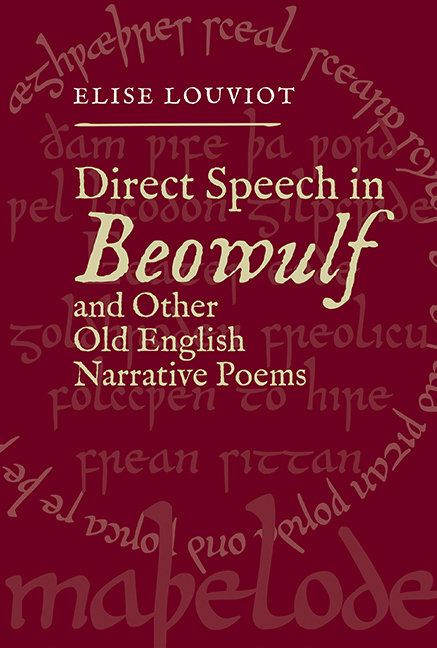Book contents
- Frontmatter
- Contents
- List of Figures
- Acknowledgements
- Introduction
- 1 The Form of Direct Speech
- 2 The Content and Context of Direct Speech
- 3 A Lack of Subjectivity?
- 4 Archetypal Subjectivity
- 5 A Problem with Voices
- 6 A Problem with Point of View
- 7 Impossible Irony
- Conclusion
- Bibliography
- Index
- Anglo-Saxon Studies
3 - A Lack of Subjectivity?
Published online by Cambridge University Press: 05 June 2016
- Frontmatter
- Contents
- List of Figures
- Acknowledgements
- Introduction
- 1 The Form of Direct Speech
- 2 The Content and Context of Direct Speech
- 3 A Lack of Subjectivity?
- 4 Archetypal Subjectivity
- 5 A Problem with Voices
- 6 A Problem with Point of View
- 7 Impossible Irony
- Conclusion
- Bibliography
- Index
- Anglo-Saxon Studies
Summary
An author, Booth tells us, can never appear truly objective to their readers:
However impersonal he may try to be, his reader will inevitably construct a picture of the official scribe who writes in this manner – and of course that official scribe will never be neutral toward all values … regardless of how sincere an author may try to be, his different works will imply different versions, different ideal combinations of norms. Just as one's personal letters imply different versions of oneself, depending on the differing relationships with each correspondent and the purpose of each letter, so the writer sets himself out with a different air depending on the need of particular works.
The implied author may either narrate the story in their own name or delegate that task to a distinct narrator, possessed of their own attitude and point of view. The story is thus mediated through at least one subjective lens, often two. In many medieval texts, such subjectivity is hard to locate. Thus, Shippey comments on the impersonality of Old English verse:
The principles [of modern literature] are unity, relevance, ambiguity, individuality; principles which can be seen and have been demonstrated everywhere in English literature from Shakespeare to Pope, from Donne to Yeats. To this Hamlet-like subtlety Old English poetry returns the blank stare of the player without personality … In Old English, style is not the man.
Several factors can explain that apparent lack of subjectivity. First of all, the concepts of implied author and narrator, which are tremendously important to modern and postmodern literature, do not apply very well to many medieval texts. As noted by Marnette, the anonymity of much of the medieval corpus is in itself evidence of the very different conception of textual authorship in that period. A lot of texts, including much of Old English poetry, do not appear as the productions of single individuals, but rather as the outcome of a complex process of transmission involving numerous actors: composers, translators, adaptors, scribes, compilers, but also, more fundamentally, all the past poets and audiences who contributed to shape the formulaic tradition, hence Pasternack's idea of an ‘implied tradition’ rather than an ‘implied author’.
- Type
- Chapter
- Information
- Direct Speech in Beowulf and Other Old English Narrative Poems , pp. 102 - 126Publisher: Boydell & BrewerPrint publication year: 2016



